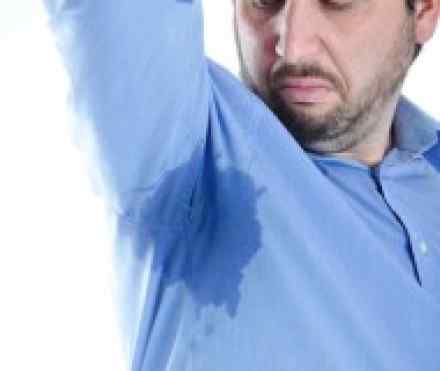
What is it?
Most people sweat when they exercise or exert themselves, are in a hot environment, or are nervous, anxious, or under stress. This type of sweating is both natural and healthy.
Sweating is usually only a minor nuisance. The odor is probably more troublesome. Although perspiration is practically odorless, perspiration can sometimes cause an unpleasant smell when it comes into contact with bacteria on your skin.
Unusual changes in sweating — either excessive perspiration (hyperhidrosis) or little or no perspiration (anhidrosis) — can be cause for concern. Likewise, changes in body odor may be a sign of a medical problem.
For normal sweating and body odor, however, lifestyle and home treatments can effectively manage your symptoms. In some cases, a prescription antiperspirant or deodorant may be needed.
Symptoms
Healthy people sweat, but when, where and how much varies widely. Factors that cause most people to sweat include:
Perspiration that's triggered by emotion is most likely to occur on your face, in your armpits, on your palms and on the soles of your feet. But how much you sweat and even the way your sweat smells can be influenced by your mood, your diet, some drugs and medical conditions, and even your hormone levels. What's more — unfair as it seems — some people inherit a tendency to sweat heavily, especially on their soles and palms.
Because it's almost impossible to define normal sweating and body odor, try to learn what's normal for you. That will help you pinpoint any unusual changes.
Causes
The cause of sweating and body odour stems from your body's temperature regulation system, specifically your sweat glands.
Your skin has two types of sweat glands: eccrine glands and apocrine glands. Eccrine glands occur over most of your body and open directly onto the surface of the skin. Apocrine glands develop in areas abundant in hair follicles, such as on your scalp, armpits and groin.
When your body temperature rises, your autonomic nervous system stimulates the eccrine glands to secrete fluid onto the surface of your skin, where it cools your body as it evaporates. This fluid (perspiration) is composed mainly of water and salt (sodium chloride) and contains trace amounts of other electrolytes — substances that help regulate the balance of fluids in your body — as well as substances such as urea.
Apocrine glands, on the other hand, secrete a fatty sweat directly into the tubule of the gland. When you're under emotional stress, the wall of the tubule contracts and the sweat is pushed to the surface of your skin where bacteria begin breaking it down. Most often, it's the bacterial breakdown of apocrine sweat that causes an odour.
Diagnosis
During your appointment, your doctor asks about your medical history and conducts a physical exam. He or she may order blood or urine tests to determine if the sweating is caused by another medical condition, such as an overactive thyroid (hyperthyroidism) or low blood sugar (hypoglycemia).
References
http://www.nhs.uk/conditions/Body-odour/Pages/Introduction.aspx
http://www.mayoclinic.org/diseases-conditions/sweating-and-body-odor/basics/definition/con-20014438
http://www.webmd.com/skin-problems-and-treatments/reduce-body-odor
https://www.hse.ie/eng/health/az/B/Body-odour/

